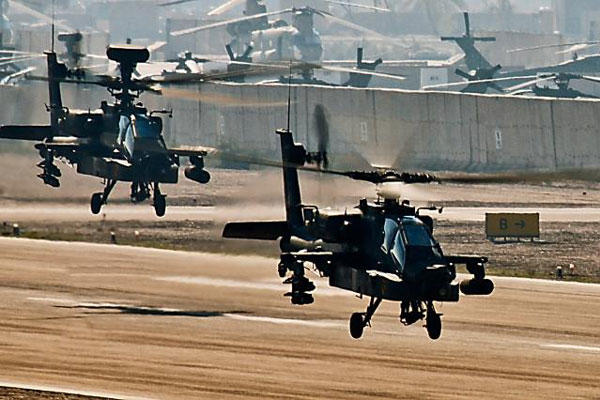U.S. Army AH-64 Apache attack helicopters have gone into action in Iraq for the first time in support of the slow-moving advance on Mosul but were being kept out of the ongoing siege of Fallujah, where increasing reports of abuses and killings of Sunni refugees have emerged.
Baghdad government spokesman Saad al-Hadithi said an investigation had begun of charges that the Popular Mobilization Forces, the Shiite militia backed by Iran that has joined the Iraqi Security Forces encircling Fallujah, had gone on a killing spree against Sunnis fleeing the city 40 miles west of Baghdad, Reuters reported.
The investigators "are following up on the violations and a number of arrests have been made. Strict orders were issued to protect civilians," Hadithi said.
Suhaib al-Rawi, governor of Anbar province where Fallujah is located, said on Sunday that 643 men who escaped from Fallujah had gone missing between June 3 and June 5, and "all the surviving detainees were subjected to severe and collective torture by various means." He charged that 49 Sunni men had been executed by the PMF.
The United Nations and Amnesty International last week said they had received "credible reports" of the beatings and executions of Sunni men and boys who were separated from the women and children after fleeing Fallujah and were interrogated on suspicion that they might be members of the Islamic State of Iraq and Syria (ISIS), or sympathizers.
Navy Capt. Jeff Davis, a Pentagon spokesman, said "we're certainly aware of the reports, the allegations against the PMF," but the U.S. was not involved in the effort to cope with the flow of refugees, or in sorting out whether ISIS members might be hiding in the groups fleeing Fallujah.
Davis said American trainers and advisers teach the Law of Armed Conflict on the humanitarian treatment of civilians to Iraqi forces, but the U.S. has no dealings with the PMF.
Davis said Apaches attacked and destroyed an ISIS vehicle-borne improvised explosive device near the town of al-Qayyarah in the Tigris River Valley about 40 miles south of Mosul on Monday.
The government of Iraqi Prime Minister Haider al-Abadi authorized the use of the helicopters for the plan to retake northwestern Mosul, but there were no immediate plans to use the gunships in Fallujah, Davis said.
Defense Secretary Ashton Carter, who was in Brussels for a NATO defense ministers meeting, told reporters on his plane Monday that the Apaches "were employed against an ISIL target, an ISIL target was struck in the operation. This is the first time that it's been called into action, and effectively" against ISIL (another acronym for ISIS), Carter said.
-- Richard Sisk can be reached at Richard.Sisk@Military.com.





























